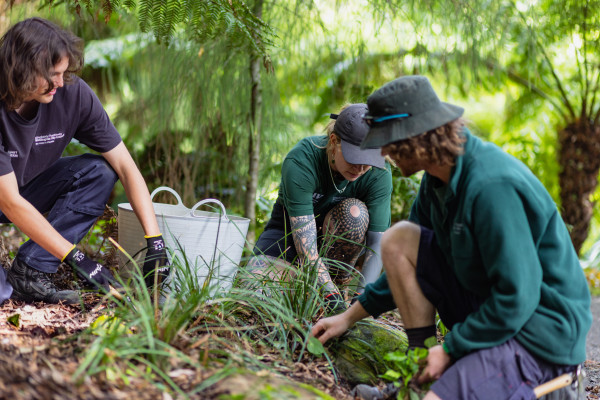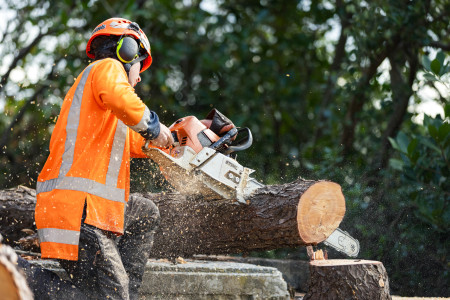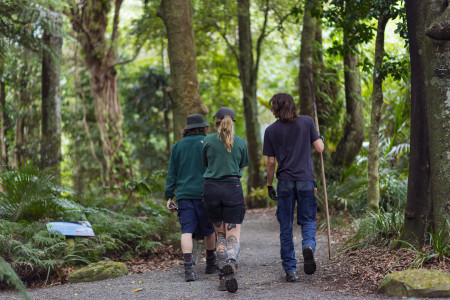Growing great careers at Wellington City Council
8 October 2024
Take a stroll through a public park or garden in our capital city and it’s likely that Primary ITO horticulture apprentices from Wellington City Council have been hard at work beautifying and maintaining the space.
Wellington City Council (WCC) is responsible for looking after the many public recreation areas across the city including parks, botanical gardens, cemeteries, sports grounds, and green spaces from Tawa in the north, to the sand dunes of the wild south coast.
More than 200 horticulture apprentices have completed Primary ITO training programmes while working for the city council Parks, Sport & Recreation team over the past 30+ years. Eleven apprentices are currently employed across a range of apprenticeship training programmes including sports turf, amenity (parks) and arboriculture (tree maintenance).

Apprentices hard at work maintaining park gardens. Photo credit: Wellington City Council.
WCC Apprentice Coordinator Elspeth McMillan oversees the recruitment and development of horticulture apprentices in the parks team – including signing them into training, providing learning opportunities, and ensuring pastoral care and support needs are met.
Fixed-term apprenticeship roles enable new staff to come on board and build a foundation of knowledge and skills, while gaining experience across the organisation. Many go on to permanent roles at the council or elsewhere.
Elspeth says the council is keen to develop people who will then follow a career path within the organisation, or the wider sector.
A typical day for the apprentices might include pruning at the botanic gardens, replanting gardens for summer displays along Lambton Quay, maintaining sports turf, propagating seeds in the Berhampore nursery, mowing grass along a roadside, and of course, weeding. The apprentices move around different areas to gain experience and help with larger jobs, such as pruning hundreds of roses in the Lady Norwood Rose Gardens each July.
“Our Amenity Horticulture apprentices rotate around different spaces including the Botanic Garden, Ōtari-Wilton’s Bush, City Horticulture Team and our in-house nurseries to give them variety and different learning experiences,” Elspeth says. “If they have a specific interest like ecology, we support them to gain experience in that area.”

Chainsaw skills are essential. Photo credit: Wellington City Council.
The apprentices vary in ages and backgrounds, some coming from university with academic knowledge, but limited practical experience …and “that’s what attracts them to the apprenticeship,” Elspeth says.
Elspeth works closely with Primary ITO Training Adviser Anne-Maree Michael to ensure apprentices are on track and meeting training requirements.
Training Adviser Anne-Maree sits down with the apprentices every eight weeks to discuss training plans, up-coming assessments and monitor progress. She is available to the apprentices and Elspeth at other times via phone and email to answer questions about the training.
While the apprentices do most of their study in their own time, they are provided with two hours of on-job study time a week that can be spent using computer facilities at council depots. Some accumulate their study time across the month and use it in a larger block session. Every six weeks the apprentices get together to listen to a guest speaker or attend a workshop, along with a yearly team building day.

An apprenticeship can be a lot of work, but incredibly rewarding for the apprentice and their workplace.
Along with the provision of high-quality tools and a uniform, the apprentices also receive professional training in tractor driving, the use of chainsaws and other specialised equipment, along with the opportunity to gain their HT licence.
Anne-Maree Michael says the apprentices are always looking to gain new skills and do more learning.
“We have a really good relationship with Elspeth and the team, working together to get the apprentices through.”
The council also has 15 staff trained as workplace assessors, who check that apprentices are demonstrating specific skills and sign off assessments as part of the training programme. Some apprentices have gone on to become assessors, “adding another string to their bow,” says Elspeth.
When an apprentice reaches a learning milestone, including finishing their apprenticeship, the team gets together to celebrate with cake at a certificate presentation ceremony. Newly minted apprentices also receive a gift in the form of a technical book on pruning.
“It’s a lot of work and it’s important to celebrate,” Elspeth says.
Find out more about Primary ITO’s horticulture apprenticeship options here, or enter your details below to talk to your local Training Adviser today.
